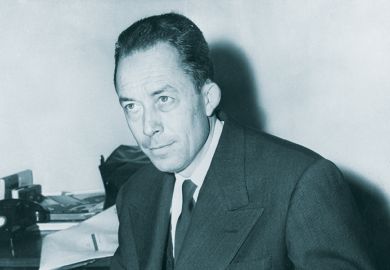There are words that sow and words that reap." One thinks of some eastern mystic such as Rabindranath Tagore or Kahlil Gibran. In fact the words belong to the Austrian philosopher Ludwig Wittgenstein but they could have been Gibran's: the form of the sentence bestows on the claim a deceptive authority, a terminative emphasis. Eastern mystics and western philosophers occasionally say the same sort of thing.
Many have heard of him; few have read him properly, though they may have read him once in their age of youthful idealism whose every enthusiasm has since proved temporary. Many have in later years forgotten him under the pressures of marriage and mortgage. Some cannot even recall his name, already an Anglicised version of the Arabic Khalil Gibran, once satirised as "Kahlil Gibberish" in a teenage comic. Robin Waterfield has written a critical and balanced biography of this Christian Arab whose art is rooted in instinct but who never let it ripen into the power and the pleasures of restrained cynicism.
Waterfield sees Gibran as an unacknowledged founder of the "New Age" movement in the West. Starting in the 1960s, this was a cult dismissing organised religion and emphasising the latent spirituality in all people. I see Gibran, however, as the first of the self-help gurus whose books now sell millions, especially in America. In 1914, Gibran wrote to Mary Haskell, his sympathetic editor and caring patron - should one say matron? - about his book The Prophet: "I do not explain or discuss. It is just said - with authority." And the message of the book? Gibran explains: "You are far greater than you know, and all is well." The oracle no longer says "Know yourself" but rather "Expand your horizons". This makes no unpleasant practical moral demands. It promises freedom and, therefore, sex. Nine million copies of this gospel have sold. Again, he once told Mary Haskell:
"There are no keys, for there are no doors." This is nonsense but it charms the ear. Waterfield, however, defends Gibran's optimism: "The Nietzschean or Romantic idea that we are bigger than we normally suppose may appeal to those, like teenagers, who are full of themselves, but perhaps more people need to acquire a taste of that fullness in order to glimpse their potential and not accept the mediocrity of their lives." If only mediocrity were a demon so easily banished.
Many westerners are moved by Gibran's message about love as the essence of God in man. But there have always been critics, mainly western, who dipped their pens in acid and dismissed Gibran's poems and paintings as giving platitudinous and immaturely enthusiastic messages. I accept this verdict and find Waterfield's apologia unconvincing. He replies in defence that Gibran sells: ten million copies in English alone. The publicity flyer is sensational: "Gibran is probably the best-selling poet of all time, after Shakespeare and Lao-tzu". With the serious book trade in deep recession, one can understand the vicarious pleasure.
Who was this man Kahlil Gibran? He was a poor Lebanese immigrant who arrived in Boston in 1895 aged 12. Nourished by patrons, mostly female, he was the grain of mustard that grew into a great tree. He lived in the squalor of Boston's slums before being adopted by Boston's literary elite. Waterfield describes a female friend as, typically, "his secretary, amanuensis and worshipper". His charisma was undeniable.
If genius is talent exercised with courage, in Wittgenstein's words, then Gibran was no genius. Courage is the basis of every virtue, particularly honesty. And Gibran was, as Waterfield admits, a shameless liar. Nor did he lie solely in his native tongue. His correspondence in English is full of grandiose fantasies about his family origins. The index has an entry marked "Kahlil Gibran, lies of" listing a dozen distinct page references.
His case is tragic. At about 40, those who do not bend usually break. Gibran was broken and dead at 48. He had been drinking heavily. The Penclub, the literary gathering headed by him, was in Arabic vulnerable to a pun and often ridiculed as "The Drinking Club". He was getting lonely despite the glamour; there were empty evenings to fill. The only hope was the long love affair conducted entirely by post - the safest way to have an affair - with the Arab writer May Ziadeh whom he never met. His love for her (herself a tragic case) was blossoming towards the end of his life while the leaves on all the other trees were falling.
Waterfield admits Gibran had faults: "anger and vanity and caring for fame". Always, Gibran loved praise and hated criticism but he blames it all on the father's side of his family. "Some of us," he boasts, "are conscious for the race." He sees himself as a man set apart for the grace and distinction of suffering, a modern Christ who experienced, in Waterfield's words, "the suffering of being laid low and the suffering of being raised high". Gibran could never hide his light under a bushel.
Gibran's megalomania is not in dispute; nor is his intellectual vanity a disputed thesis. But Waterfield does not note that Gibran merely displays the failings of Arab Christian intellectuals in general: ambitious out of proportion to their talent, insinuating, meretricious, and self-deluding. Gibran adds to this the vice of manufacturing sentimentalism.
The extent of Gibran's ambitions is admirable. Given his Maronite Catholic background, we are not surprised by his Jesus, the Son of Man, which reads, adds his biographer, "as a new, apocryphal gospel". Yet many of his books were written while he was resting on his laurels. His thoughts on women are a hotchpotch of confusions. He unthinkingly disliked blacks and Jews. He was, albeit instinctively rather than intellectually, a humane anarchist in his politics, though Waterfield does not say so.
Waterfield admires Gibran's unfailing optimism. Gibran knew that all that we love is illusory and transient. But he would add: "Therefore, to be loved and cherished the more." After a financial crisis, Gibran is comforted by Mary Haskell, retailing his own wisdom back to him: loss of money still leaves the soul intact. But Gibran had some money salted away for a rainy day. That would help to keep the soul in good shape.
Waterfield's final assessment is unsatisfactory because he lists his subject's undeniable imperfections while still claiming greatness for him. In his attitudes towards his art and life, Gibran was actually a saint: fanatically attached to his ego, monomaniacal, dedicated and faithful to his painting and writing. But where were the virtues of honesty, sincerity and courage? The issue here is not perfection: we do not expect that of poets. Luckily for Gibran, his biographer takes the advice of the Scottish poet Robert Burns, another womaniser, to "gently scan thy brother man".
Shabbir Akhtar is writing a biography of St Paul.
Prophet: The Life and Times of Kahlil Gibran
Author - Robin Waterfield
ISBN - 0 713 99209 3
Publisher - Allen Lane The Penguin Press
Price - £20.00
Pages - 366
Register to continue
Why register?
- Registration is free and only takes a moment
- Once registered, you can read 3 articles a month
- Sign up for our newsletter
Subscribe
Or subscribe for unlimited access to:
- Unlimited access to news, views, insights & reviews
- Digital editions
- Digital access to THE’s university and college rankings analysis
Already registered or a current subscriber? Login



